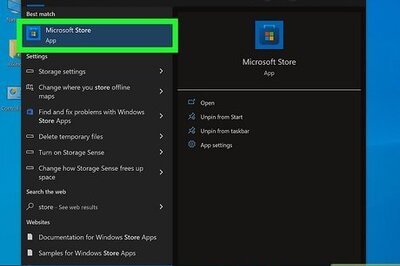
views
Deciding What to Do
Identify the real problem. Whether the two of you have been fighting a lot over silly little issues or you’ve both completely checked out and stopped fighting altogether, the odds are it’s time to really analyze what the core problem in the relationship is. If you’re thinking about breaking up but you aren’t sure, take the time to self-assess and reflect on what’s actually driving the relationship in the wrong direction. You might consider the following questions: Is a personal issue driving a wedge in the relationship? If one of you are dealing with some serious mental health issues, for example, it can make managing a relationship difficult. Have you (or your partner) grown or changed too much? People change over time and if one of you has changed radically, it could mess with the nature of the relationship. Are your underlying values in conflict with one another? If you want kids but your partner doesn’t, it can eventually create a serious issue. Has the past been impossible to escape? As an example, if your partner cheated on you and it’s just too much to get past, it can be difficult to trust again.
Determine if the problem can be resolved. Schewitz says that once you know what’s at the core of your relationship’s problems, you can assess whether that central issue is fixable. If it is, now you can focus on that! If it isn’t, at least you know you’re past the threshold of a decision and you can start planning your next steps. If the problem can be fixed: Don’t tell your partner you were thinking about breaking up. Instead, sit down with them and talk about the issue to come up with a solution together. If the issue is ultimately a dealbreaker: Now you can move forward knowing that it’s time to break up. Are you still not sure? If you aren’t totally confident either way, consider talking to a therapist about the issue. A professional counselor or therapist can help you come to a decision.
Expert Guidance on When to Stay vs. When to Leave
Have you actually tried to fix your relationship? Schewitz poses a few key questions: “It’s important to know there’s a lot you can do to help a relationship, so have you done your due diligence? Have you tried couples therapy? If you really feel like you want this to work, you love this person, but you're just not getting along, then I think that’s the place where you should probably reach out for help and acknowledge that you don’t have the skills to fix it.”
Was this relationship really primed to last? Schewitz explains that you must “consider your feelings for this person. Be radically honest with yourself. Was there ever a strong connection or a strong love there or did you sort of rationalize yourself into this relationship by thinking he’ll be a good partner because of this quality or that quality, odds are there wasn’t ever anything that strong to hold onto from the beginning.”
Discussing a Potential Breakup Together
Choose a time to chat when things aren’t tumultuous. If you bring up the subject of potentially breaking up while the two of you are actively fighting, it’s going to come off as a rash and hasty appeal at dramatics. Wait until things are calm and broach the subject with empathy. You might say: “I care deeply about you, and I'd like us to talk about something important. Is now a good time for an honest conversation?” “I’ve been bothered for a while by something weighing heavy on me. Is it okay if we sit down to talk later tonight?” “I really want to respect you and respect this relationship by being totally honest with you. We should talk if you have the time and headspace for it right now.”
Be radically honest and open about what’s on your mind. Schewitz says that “open communication is the single biggest thing when it comes to making big decisions in a relationship.” Even if you partner gets mad when you broach the subject, just let them get the steam off and continue to be as vulnerable as you possibly can: “Our relationship hasn’t felt all that great lately. I think I’m committed to making this work, but I’m not so sure if we’re on the same page.” “I know we’ve had our struggles but I get the feeling that you’re never going to be able to trust me after what we’ve been through.” “I know you care about me but it’s beginning to feel like maybe we aren’t right for each other? I don’t necessarily want to breakup, but I’m kind of getting the vibe that this might be what you want?”
Discuss next steps together. If there is a potential compromise or solution that the two of you could work out, this is the perfect venue to discuss it. The framing of the potential breakup will make the severity of the issue really hit home. At the same time, if they’re on board with the breakup idea, perhaps it’s time to talk about what comes next. Just listen and hear your partner out. “I know we haven’t really looked into therapy, but maybe this is the wake-up call we need if we’re going to make this work.” “You sound pretty committed to this break idea, so let’s talk about it. What does that look like for us? Are we still exclusive? Are you moving back in with your folks?” “If we’re going to make this work we have to make a change when it comes to how we talk to one another. Can we map out what that’s going to look like?”
Remember that you don’t have to make big decisions fast. There’s absolutely nothing wrong with hitting pause on a serious conversation if things are getting heated. It’s also likely a wise idea to pause if you and your partner can’t come up with a clear path forward or if you can’t decide on whether you’re breaking up or not. The following phrases might help: “We can hit the pause button on this. I know you’re upset. I’m upset, too. Let’s come back to this when we’re in a better space.” “It’s okay to sleep on it. I know I’m still not sure what comes next, so let’s just take things slow, yeah?” “If we’re going to end things let’s make sure it’s really the right decision. We can take a few days to clear our heads and really figure out the best move for us.”
Breaking Up & What to Say
Lead with something positive and true. There’s no point in harming the person you once loved, even if things may not be ending in the most productive or comfortable way. Begin with something honest and loving to start things off on an unconfrontational note. “Nobody means as much to me as you do, and nothing will ever change that.” “I’ve loved our time together. Nothing could ever replace you.” “Our relationship has been one of the most rewarding things I’ve ever been involved in.”
Explain why you want to break up (optional). If your partner doesn’t know why this is happening, it’s a good idea to give them some context. Explain what the last straw was. At the same time, if this has been an ongoing issue and they’re aware of what’s wrong, there’s no point in hashing it out again. “I’m just unable to get past all of the hurtful things we’ve said to one another the past few months.” “We’re going to different schools next year and I just don’t know how we’re going to make it work—especially since we’re going to be so busy.” “The infidelity is not something I think I can live with. Even if it does stop, I’m just not going to be able to sleep at night.”
Be clear that you want to break up. Don’t leave the door open for any confusion. Don’t try to sneak your way out of a tough spot by suggesting you can get back together later or that you only need a break or anything like that. Be 100% clear about the relationship ending. “I’m sorry, but I can’t be with you anymore. We’re breaking up.” “I know we’ve talked about working on our relationship but I just can’t do it. This is the end.” “We’re breaking up. I’m so sorry, but I think it’s the right thing for both of us in the long run.”
Let your partner express themselves. The odds are high you’re going to hear some choice words at some point. Don’t let it eat at you. Treat it like water off your back. It’s important to let the person being dumped get some steam off, so try to just hear them out without clapping back.
Should you go no contact?
It’s best to go no contact, at least for a few months. Schewitz says, “I think it’s especially important to break all contact if you’re in an on-again/off-again relationship where this contact means you could end up hooking up or getting back together when it’s not the best idea.” Regardless, taking at least 6 months to get your ex off your mind and give the two of you time to heal will be the best way to get past this. If things ended amicably and you know you’ll want to reconnect or be friends in the future, there’s nothing wrong with letting your ex know you’re going no contact ahead of time. To stay no contact, keep your ex blocked on all forms of social media, block their number from calling or texting you, and get rid of anything that reminds you of your ex.
When to Talk to an Ex
As a rule of thumb, divide the time you were together by 2. If you dated 4 years, wait at least 2 years before you reach out to reconnect. If it was a 6-month relationship, wait 3 months before hitting your ex up. This will give both of you time to process and grieve the relationship so that you aren’t coming into the reconnection with charged energy. Every situation is different. If you think the relationship was just a bit too heavy to justify the “divide by 2” rule, give it extra time.
If you want a debrief, wait until you’re totally over your ex. A relationship debrief (or “post-mortem”) is where you sit down with an ex to discuss what went wrong. Wait until you’re completely over your ex to get the most out of this conversation. If you’re still into them, you won’t have the headspace to view the conversation objectively. Schewitz says, “Not every relationship is meant to last. So when you debrief, you’re asking yourself, ‘What did I learn? And how does this fit into my journey of evolution as a human being?’ Being able to answer those two questions after you've gone through the grieving process, you'll usually get some closure.”
If things ended mutually, you can reach out whenever. Schewitz says, “If things ended peacefully and you need to reach out every once in a while and say ‘I’m sad’ just that, I think that's fine.” It’s normal for a relationship that ended on mutual terms to have a kind of “off-ramp” where you two help and support one another through the process, so don’t sweat it if you feel compelled to reach out and talk.




















Comments
0 comment